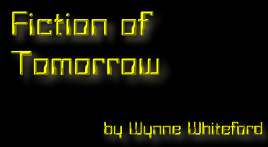|
Whatever it is, or however it is transmitted or displayed, I think it's a safe bet that a large proportion of it will be classifiable as SF, whether you take the acronym to mean "science fiction" or "speculative fiction", or whatever new marketing label is applied to it in that era. For it's well to remember that science fiction is simply a marketing label, useful to readers and reviewers to locate the type of material they want to read, or view, or absorb, whether from a printed page, a video or a hologram. The genre it describes, exploring the human imagination to evolve hypothetical worlds or situations somehow modified from everyday reality, is ancient beyond the genesis of mythology. In wide sense, it is independent of the method of transmission, beginning with traditional stories told verbally around the campfires of the Neolithic, following on through inscriptions cut into clay tablets by the Sumerians, the Egyptian inked writing on papyrus, and on through Gutenberg and Merganthaler's linotype to desktop publishing with computers and ink-jet printers. So, although the label was introduced less than seventy years ago, the genre is part of a tradition of thought-provoking entertainment that spans the whole of recorded history. As styles in fiction and myth have changed, so have their audience, readers and/or viewers. It might be interesting to delve into the cause and effect relationships between changes in fiction and in people's lifestyles over the centuries. Any attempt to predict the trends of tomorrow has to begin with an overview of the past, to gain, as it were, a three-dimensional view of the directions in which these trends are moving. Even the past few decades have shown small but significant differences in people's ways of thinking, when you contrast those who collect their data from newsprint with those who absorb it from TV. Throughout history - yes, and through what we can know of pre-history - changing methods of transmitting information from one individual to another have left an identifiable mark on the thought processes of the human race. It has been claimed recently that the most significant evolutionary step that led to the rise of the human species was not the development of the opposable thumb, vital as that was, but the modification of the mouth and tongue structures that permitted subtlety of speech, leading on to the evolution of language.
| ||
| So this brings us to the basic difference: In material absorbed from the printed page, the readers have more input - it is their visualisation of the scenes and characters suggested by the author that remains with them as what we might call a "pseudo memory". The coming generation of TV will make available not hundreds of channels, but thousands, recoverable by satellite from New York, Oslo, Osake, maybe some base on the Moon or on Mars - you name it. Only one thing I'm sure of: A big proportion of it will be some kind of SF. Wynne Whiteford. Originally published in the Science Fiction, Fantasy and Horror Fan Resource Book.
|
||
| Wynne Whiteford short stories often appear in Australian collections - especially those of Paul Collins. His books include Breathes in Space, Sapphire Road and Thor's Hammer. Interested in SF? Use our yellow site search at left. See also: OZ Odyssey -- A Personal View of Science Fiction Writing from a Fan Down Under by Bruce Gillespie Robert O'Reilly - The Man Behind Star Trek's Gowron by Ali Kayn Science Fiction Film -- The Interesting Old Stuff by Terry Frost Terry Pratchett -- Master of SF Humour by Ali Kayn Anne McCaffrey -- The Lady from Dragonhold by Ali Kayn Part of the Legacy -- an interview with Majel Barrett Roddenberry Many science fiction authors and actors have answered the usual questions
|
|||
 |
Celebrate everything!
www.festivale.info
ISSN 1328-8008
Published in Melbourne, Victoria, Australia
disclaimers | contact the editor | Festivale revision history
 Published in Melbourne, Victoria, Australia
Published in Melbourne, Victoria, Australia  copyright © Festivale 1999 All rights reserved
copyright © Festivale 1999 All rights reservedFiled: date: 1-Apr-1999
Entire site refreshed: Dec 2008-Feb 2009 | Site URL transferred: Jan 2005 (previously www.festivale.webcentral.com.au)




